- Home
- Aaron Allston
Star Wars: X-Wing VI: Iron Fist Page 5
Star Wars: X-Wing VI: Iron Fist Read online
Page 5
Wedge brought out his datapad and tapped up the information on living assignments. It showed that Donn had been put in the same bunkroom as Runt Ekwesh. Runt’s former roommate had been Kell Tainer, but that pilot had been assigned solo quarters ever since his promotion to lieutenant. “Is something wrong with your current assignment?”
“Yes, sir. I’m not getting any sleep.”
“I don’t understand. Does Runt snore?” Kell had never made any such complaint.
“No, sir. It’s just not working out.”
“Personality conflict.”
“No, sir.”
“Request denied, Donn. Unless you can come up with something a little more substantial than ‘it’s just not working out.’ ”
Castin squirmed in his chair. Wedge thought it an unusually childlike mannerism from a grown man who’d been through pilot training and scored high enough to be fit for Wraith Squadron. “Sir, he, uh … he smells.”
“I take it you mean he smells bad.”
“Yes, sir. It’s keeping me up at night.”
Wedge kept his face impassive and thought about it. Runt Ekwesh was a member of the Thakwaash species, humanoids who averaged over three meters in height and were covered with fur; Runt came by his nickname because he was, in fact, very short for his species, the only reason he could fit in standard New Republic cockpits. And his odor was indeed different from that of humans, though it was very faint, usually undetectable except when he was wet or had been in the cockpit for several hours.
Wedge kept the pilot waiting, still squirming restlessly, while he brought up Castin’s full record. The man, a native of Coruscant, had been a code-slicer since he entered his teens, and had belonged to a rebel group not associated with the Alliance. Shortly after the Emperor’s death, nearly four years ago, he had forged himself a false identity, arranged passage offworld, and had ended up in New Republic-controlled space, where his technical skills had served him and the New Republic well. After two years as a coder for the fleet, he’d transferred to Starfighter Command and entered pilot training.
The synopsis said very little about him as a man. Wedge switched to the record of his citations and reprimands. He’d seen all this data before, while reviewing the new pilot candidates for approval, but he’d been looking only for specific types of information then.
There were citations for courage and ingenuity under fire, but also many punishments for failure to perform routine duties in a reliable fashion. That hadn’t bothered Wedge; he knew Castin would either shape up in that regard or be kicked out of Starfighter Command altogether, a motivation that should keep him in line. But in the record was also a chronicle of personality conflicts with fleet bridge crew members, mostly Mon Calamari. Transfer from the fleet accepted after a fistfight … with a Sullustian navigator. Hmm.
“I could put you in with Piggy. Voort saBinring,” Wedge said.
Castin’s squirming became more acute, and Wedge suspected he had the answer.
“I’m not sure that would work either,” Castin said.
“Same reason?”
“Yes, sir.”
“Donn, this independent revolutionary faction you belonged to—were there any nonhumans in it?”
“No, sir.”
That was interesting. Most such factions on Coruscant had high proportions of nonhuman members. The factions that didn’t include nonhumans tended to be just as anti-Imperial … but had still supported Coruscant culture’s legendary suspicion and dislike of nonhumans.
“So you’ve had very little protracted contact with nonhumans.”
“Well … that would be correct, sir.”
“I’m sorry, Donn, but I’m afraid this is something you’re just going to have to get used to. Whenever it bothers you, you need to ask yourself, ‘I wonder what I smell like to them?’ ”
Castin’s voice dropped and came close to but did not quite cross into the realm of surliness. “I don’t smell at all, sir. I keep myself very clean.”
“But their senses aren’t like yours. If you ever get up the nerve, ask them sometime if they can smell you and what it’s like. You might be surprised by the answer.”
Castin’s expression became one of distress. “But, sir, we have plenty of room here at base—”
“But not everywhere we’re going. I’ll modify room assignments when there’s a genuine reason to do so. Not before.”
“Sir—”
“That’s all, Donn.”
It looked just like the bridge of the Iron Fist. It had its own command walkway facing the forward viewports, the ones that stared out into depthless space. It had its crew pit below, with its numerous crew stations.
But it was actually a portion of Warlord Zsinj’s private quarters, a replica of the true bridge, and it had no crew. The viewports were actually screens receiving holocam views from the real viewports. The viewscreens at the crew stations showed the data or visual feeds the crewmen on duty would be accessing if they were here; commands flickered across the screens and were executed as though the station operators were in place. But sounds from the console speakers—beeps, dialogue, noises indicating errors or computer achievements—were the only ones to be heard. No one spoke.
Warlord Zsinj moved among the ghost stations, peering over the shoulders of imaginary crewmen as if to evaluate their performance. A small man whose waist outperformed his chest in dimension and magnificence, he looked like a holo comedian pretending to be an officer: His spotless white uniform was that of an Imperial grand admiral, while his bald head, luxuriant mustache, florid complexion, and too-cheerful manner suggested a backwater bandit.
He bent over the back of a chair; the screen before him showed a fleeing Y-wing attack craft as if seen through the viewport of a pursuing TIE interceptor. The background was a busy battlefield; Zsinj recognized the chaos of the battle above Endor’s sanctuary moon, just under four years ago.
He leaned closer to see the name of the crewman logged onto the computer. “Ah, Ensign Sprettyn,” he said. “Running attack simulators again while on duty. Shirking your responsibilities again.”
“Perhaps he wants to become a pilot.”
The voice, smooth and reassuring, came from behind Zsinj. The warlord straightened and turned. “General Melvar. What have I told you about creeping up behind me?”
The general, a tall man with features that were elegant when he was paying attention but impossibly bland and unmemorable when he lost concentration, smiled. “Not to.”
“And what did you just do?”
“I stomped up to you with all the silent grace of a gut-shot rancor. You were so intent on your observation of poor Ensign Sprettyn’s activities you failed to notice me.”
“It’s the sign of pure concentration. The ability to shut out all other concerns.”
“Of course.”
“What do you want?”
The general handed him a datapad. Lines of data were already up on its screen. “A private communication for you. Through Admiral Trigit’s old routing system.”
Zsinj gave him a look that was all raised eyebrows and curiosity, then scanned the text. “Hmm. Lieutenant Gara Petothel. Expects to be a member of one of Antilles’s squadrons within a few weeks. ‘Would you be interested …?’ I see she has a fine sense of irony. What do you have on her?”
“I’ve put her file in there with the communiqué. In short, she’s an Imperial Intelligence prodigy who was orphaned—she was in deep cover as a Rebel mission coordinator when Ysanne Isard was killed. Her controller was a member of Isard’s support staff and also died. Petothel managed to get in touch with Apwar Trigit, offered her continued services to him, and fed him information that led Trigit to some important temporary provisioning centers and allowed him to annihilate an entire Rebel X-wing squadron. She joined his crew and was presumed dead when the Implacable was destroyed.”
“Oh, she’s that one. So she eluded capture. Or perhaps not. Perhaps she was captured, then turned, and is being
used to flush us.” Zsinj shrugged. “Where’s her holo?”
“We found that holos of her in both Imperial and Rebel records show the wrong woman. She has covered her tracks well. I’m having a simulation assembled from people who were in her Rebel academy class … which will take some time and caution.”
“Very well.” Zsinj handed the datapad back. “Pursue this. Have an agent or a cell on Coruscant try to do independent verification of what she’s saying. Find out what identity she’s currently wearing. Once that’s determined, we must find out where her loyalties lie before we commit any real resources to her.”
“Done. And Ensign Sprettyn?”
“Do you want to handle that? It’s a task for his executive officer.”
“I’d be happy to.”
“Very well. Sprettyn is under direct orders not to waste time with the simulators, but he just wants to fly too much. So spirit him off into the night. Tell the rest of the crew he’s been executed for disobeying orders. But tell him that he’s being taken aside for pilot evaluation. Put him through the simulators.”
“And if he turns out to be a good pilot trainee?”
“Weren’t you listening?” Zsinj looked regretful. “I deplore the waste of good crewmen, I really do. But we can’t have pilots who disobey orders. Evaluate his piloting performance, chastise or compliment him as appropriate, then execute him.”
“The evaluations of the three Zsinj theories have come back from Admiral Ackbar’s office,” Wedge said.
They were in the briefing room temporarily assigned to Wraith Squadron. This was an office far enough down in the building that there were no viewports; viewports would only have shown a depressingly bleak vista of dark, grimy duracrete corridor between the lower reaches of skyscrapers. Instead, the orange walls were decorated with large holoscreens that transited between views shot from planetary orbits, vistas of distant and beautiful worlds, and promotional images of hotel resorts belonging to the same chain that had once owned this facility. The Wraiths were all seated near Wedge’s lectern, except for Shalla Nelprin, who paced at the back of the hall—until Wedge caught her eye. She quickly sat in the seat nearest to her.
“Before I get to the admiral’s conclusions,” Wedge continued, “I think we ought to let the writers of the three reports synopsize their conclusions; not everyone has heard these. Runt?”
The long-faced alien stood up. His body language changed; his posture became that of a human carrying a fair amount of extra weight and he folded his hands over his belly in the fashion of a well-fed senator. “In our considered opinion,” he said, once again taking on the mellow voice of the ersatz Zsinj, “the warlord’s overt and covert tactics suggest that he will continue to add resources, industrial and planetary, with as much cost-effectiveness as possible. This means continuing the expansion of the secret financial empire whose edges we detected … and a more direct appeal to the unaligned governors that previously belonged to the Empire and now belong to the Empire’s successors. I think this means using Iron Fist in actions of direct interdiction that benefit these governors more than Zsinj himself, an effort to bind the governors to him in debts of gratitude.”
“And your recommendations for ways to counter this?”
“Examine the resources of unaligned governors, find out which one it would best serve Zsinj to court, and cause that governor problems only Zsinj can solve … luring him to that system and confronting him directly.”
“You’re very erudite in this mind, Runt.”
Runt’s body language changed back to normal; he once again seemed lanky, overtall, a little awkward. “But it makes our ego puff up like a gas giant.” He sat.
“Piggy?”
The Gamorrean stood. He cleared his throat. Once upon a time, that would have blasted the Wraiths with a burst of static, but his throat translator had since been reprogrammed to squelch a wider variety of irrelevant sounds. “In the last few weeks, as we were nibbling at the edges of Zsinj’s organization, we found three anomalies. One was the network of manufacturing corporations owned within unaligned and even Alliance-controlled space by Zsinj under false identities. One was his attempt to hire a pirate nest made up of outlaws somewhat under his usual standards. And the third was the presence, at one of his companies, of prison-cell components identical to the cell where I was raised after Imperial scientists altered my biochemistry.” The scientists’ alterations were what gave Piggy his unusually temperate personality—for a Gamorrean—and his inhuman mathematical acumen, both traits that allowed him to become a proficient New Republic pilot.
Piggy waved, his gesture taking in Myn Donos, the 3PO unit Squeaky, and Castin Donn. “My group feels that the industrial connection is something better suited for New Republic Intelligence to pursue, so we eliminated it from our recommendations. Of the two that remain, the site where I was scientifically modified and reared is of great interest to me personally, but we all feel that we would have a greater chance of discovering Zsinj by disguising ourselves as a pirate band and trying to impress Zsinj enough for him to employ us. This would keep us in close association with starfighters and play to the strengths that I think we demonstrated in the pursuit of Admiral Trigit and the Implacable.”
“Well put, Piggy. Face?”
The onetime actor stood. “Well, first I have to admit to a certain dissension in my own group. Lieutenant Janson and Ton Phanan here think that Runt’s idea is best. Dia Passik and I both favor Piggy’s pirate scheme. But since I was obliged to come up with a tactic, I have.
“Intensive analysis of Zsinj’s history suggests that he draws much of his inspiration from the performances of small theatrical companies. I suggest that we pose as a traveling troupe of players performing the sorts of works he seems to have the most affection for.”
Confused, Wedge scanned his records of the proposals the group leaders had generated. Face’s was on top, but its contents did not match what he was saying.
“I’ve discovered that Kell has a pleasant tenor singing voice, and Runt is actually an accomplished mime, a skill that few know is widespread on his homeworld of Thakwaa. By integrating modern holographic technology with traditional song-and-dance routines, we could capture the warlord’s attention—”
By now the other Wraiths were snickering. Wedge caught Face’s eye and glowered. “Perhaps you could give us the set of conclusions you turned in to me, Loran?”
Face had the gall to look surprised. “Oh, those. Sorry.” He sobered. “I think the Iron Fist is of tremendous importance to Warlord Zsinj, not just as a powerful weapons platform but also as a symbol, both of his career and his power. If Warlord Zsinj were more like us than he were like himself, I think he’d launch an expedition deep into the territory governed by Ysanne Isard’s successors, make a strike on the Kuat Drive Yards building facilities, and steal the next Super Star Destroyer in production.”
Wedge gave him a look of amusement. “That presupposes that Kuat is working on another Super Star Destroyer. They’re horribly expensive. And even though they can do an incredible amount of damage, they can be destroyed by a much less expensive enemy force … though usually at a tremendous cost of life.”
Face nodded. “Correct. But Zsinj doesn’t admit anyone is his equal in military intelligence, so he thinks he can keep it intact. And I keep remembering that he, Zsinj, hinted that he was promoting Admiral Trigit to a better position. We all thought maybe he meant captain of the Iron Fist, but what if he meant another Super Star Destroyer?”
Phanan spoke up. “Don’t forget your goofy ideas that never made it into your final proposal.”
Face waved him away, but Wedge asked, “What goofy ideas?”
Face looked unhappy. “Just an idea. Ysanne Isard is alive.”
“What?” Wedge looked as stunned as if someone had picked up a chair and broken it over his head.
Ysanne Isard had been the head of Imperial Intelligence when Emperor Palpatine died years ago. She survived Palpatine’s successors,
a consortium of Palpatine’s advisers, and gradually assumed control of the Empire herself—though not in name. Months ago, she had died, killed fleeing the planet Thyferra in a battle-equipped shuttle, shot down by Rogue Squadron’s Captain Tycho Celchu.
“Follow me on this,” Face said. “Months ago, Ysanne Isard is chased off the world of Coruscant. Actually, she abandons it voluntarily to let the Krytos Plague infect the nonhuman population and lock up all of the New Republic’s resources when we occupy Coruscant. But she actually stays on Coruscant for quite some time after she pretended to flee. Eventually she really does leave, goes to Thyferra, takes over there, and is finally wiped out by the Rogues.
“Except—she was never seen climbing into the shuttle she was supposed to be using for escape. Except—it was not particularly intelligent for her to run off in a vehicle slower than the X-wings she had to have suspected would follow her. Except—she’d already shown a tendency to hide out with her head down when she was supposed to have fled. It raises the question: What if she actually wasn’t on that shuttle, and was communicating with the Rogues ‘chasing’ her through a remote-control link?”
Wedge said, “You’ve got to be wrong. There was no lag time in her transmissions, nothing to suggest she wasn’t there.”
“A shuttle she’d personally fitted as an Emperor’s escape vehicle might have a miniaturized hypercomm system. With instantaneous transmission and reception, there wouldn’t be any lag time.”
“Face, do you believe she’s alive?”
Face shook his head. “Sometimes I hope she is. I’d still like to kill her myself. But I believe Captain Celchu actually killed her. Still …” He shrugged and resumed his seat.
Wedge gave him an exasperated stare. “Well, here’s your punishment for nearly giving me a heart attack. Write this theory up and I’ll route it on to the new Thyferran government and to General Cracken at Intelligence. Between them, they should be able to sniff out any other evidence for Iceheart’s survival … if there is any.”

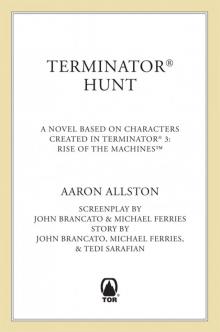 Terminator 3--Terminator Hunt
Terminator 3--Terminator Hunt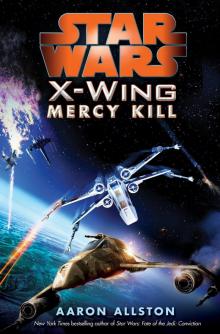 Mercy Kil
Mercy Kil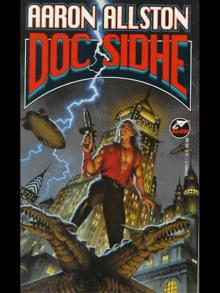 Doc Sidhe
Doc Sidhe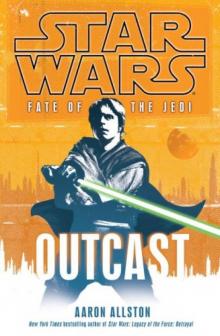 Star Wars: Fate of the Jedi: Outcast
Star Wars: Fate of the Jedi: Outcast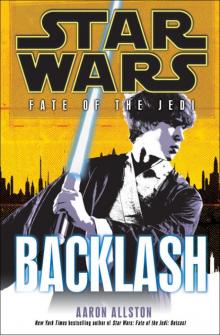 Fate of the Jedi: Backlash
Fate of the Jedi: Backlash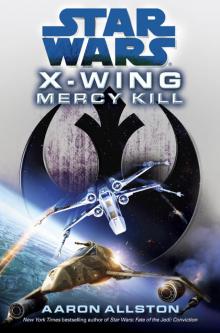 Mercy Kill
Mercy Kill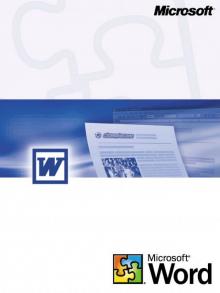 Rebel Stand
Rebel Stand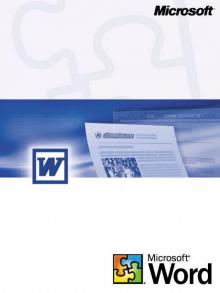 Wraith Squadron
Wraith Squadron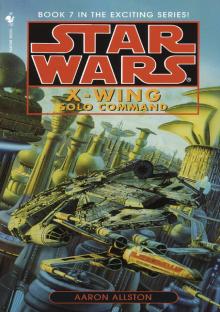 Star Wars: X-Wing VII: Solo Command
Star Wars: X-Wing VII: Solo Command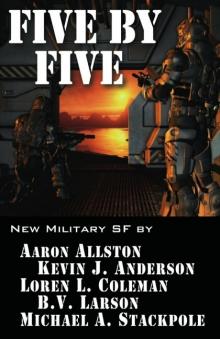 Five by Five
Five by Five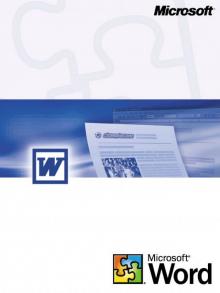 Solo Command
Solo Command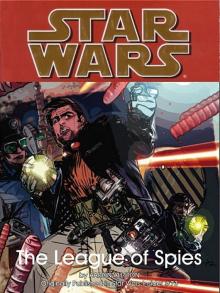 Star Wars: The Clone Wars Short Stories: The League of Spies
Star Wars: The Clone Wars Short Stories: The League of Spies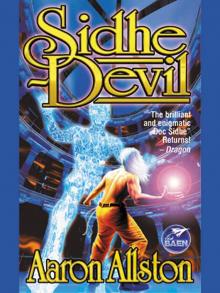 Sidhe-Devil
Sidhe-Devil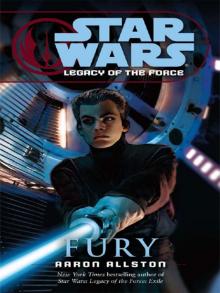 Star Wars: Legacy of the Force: Fury
Star Wars: Legacy of the Force: Fury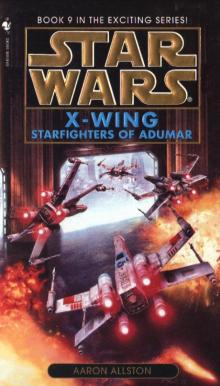 Starfighters of Adumar
Starfighters of Adumar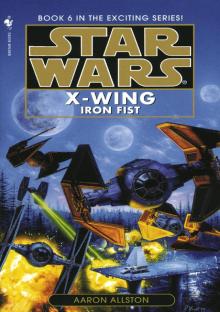 Star Wars: X-Wing VI: Iron Fist
Star Wars: X-Wing VI: Iron Fist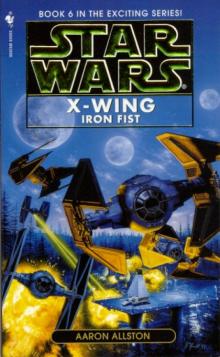 Star Wars - X-Wing - Iron Fist
Star Wars - X-Wing - Iron Fist Exile
Exile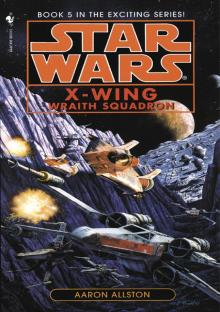 Star Wars: X-Wing V: Wraith Squadron
Star Wars: X-Wing V: Wraith Squadron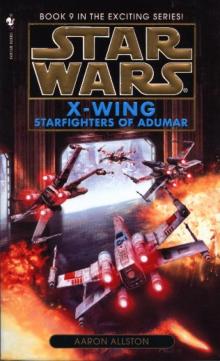 Star Wars - X-Wing - Starfighters of Adumar
Star Wars - X-Wing - Starfighters of Adumar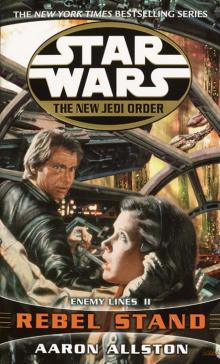 Rebel Stand: Enemy Lines II
Rebel Stand: Enemy Lines II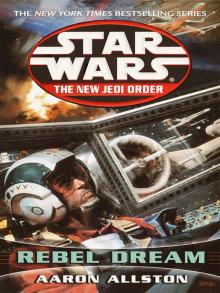 Rebel Dream: Enemy Lines I
Rebel Dream: Enemy Lines I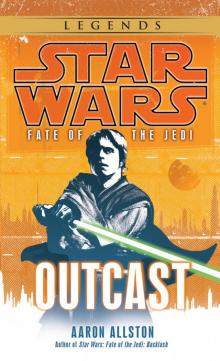 Outcast
Outcast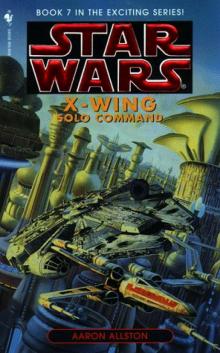 Star Wars - X-Wing 07 - Solo Command
Star Wars - X-Wing 07 - Solo Command